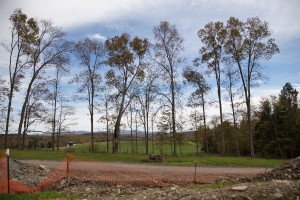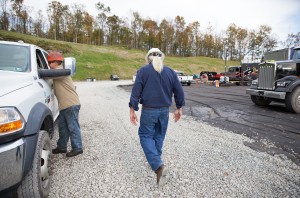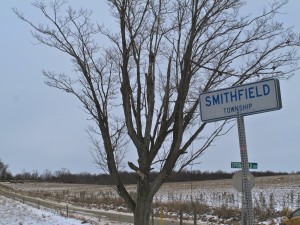Pa. towns with no zoning rules unlikely to limit gas drilling
-
Katie Colaneri
It seemed like a game-changer late last year when the Pennsylvania Supreme Court restored the power of local communities to limit natural gas development within their borders. After all, three out of every five municipalities on the Marcellus Shale have zoning laws to that would apply. However, in the state’s rural Northern Tier, where drilling has flourished, some towns aren’t eager to wield this new clout.
In most of Pennsylvania, industrial activities are controlled by local governments using zoning. They have community plans that tell businesses how loud they can get or how high they can build, or how close they can be to your house. But in the northeast, many communities don’t have these kinds of rules and most people like it that way.
In Susquehanna County, Planning Director Bob Templeton says the idea of zoning has never gone over well.
“People are not rich in Susquehanna County, but what they do own is their land and they’re very proud of that,” he says. “It’s been passed down for generations, so don’t mess with my land.”
After the natural gas industry moved in, the county passed an ordinance to deal with noisy compressor stations that move the gas through pipelines. Otherwise, Templeton says many residents in Susquehanna – where only six of the county’s 40 municipalities have adopted zoning codes – just accepted the changes to their rural lifestyle.
“If I’m out in the townships and I’ve leased my land and now I’m looking forward to royalties, I don’t want somebody controlling it,” he says. “How can you say this area is allowed to be drilled upon and this area is not?”

Lindsay Lazarski / WHYY
Farmland and trees surround a Cabot Oil & Gas fracking site in Susquehanna County, Pa.
Meanwhile, since the boom began in 2008, the most productive Marcellus Shale wells have been drilled in northeast Pennsylvania.
That doesn’t surprise Bradford County Planning Director Ray Stolinas.
“Fortunately for them, it’s not an urbanized landscape because they can pick and choose where the most viable place is to set up a pad and tap into the Marcellus and convey that via pipeline to compressor stations within the countryside,” Stolinas says. “I look at the Tennessee [Pipeline] as one of the major highways just like route 80 or route 81.”
Stolinas says companies have worked with municipalities to address impacts, such as putting up sound muffling buildings that resemble barns to fit in with the bucolic landscape.
“There’s nothing in the law that says they have to do it that way,” he says.
Time is money
A StateImpact Pennsylvania analysis, using data from the Department of Economic and Community Development, shows that about 40 percent or two out of every five municipalities on the Marcellus Shale don’t have zoning laws on the books.
But the fact that the others do is a problem, according to Blaine Lucas.
Lucas is an oil and gas industry attorney with the Pittsburgh-based firm Babst-Calland. At his end of the state, he says, more municipalities are likely to use their zoning muscle. In the state’s western half, prime drilling territory sits closer to more populous suburbs.
“A lot of the conflict tends to arise more where you have conflicting land uses, where you have encroaching suburban development adjacent to a rural farm area,” Lucas says.
And Lucas says, time is money – money the industry doesn’t want to spend working around hundreds of differing local regulations.
In early 2012, the state legislature tried to spare the industry that problem. It passed Act 13, which set statewide rules for drilling that superseded local zoning, and allowed drilling in all zoning areas with certain buffers.
“Communities set up comprehensive plans for how their communities can be best developed to foster sustainable growth,” says Jordan Yeager. “What Act 13 did was throw all that away and say that folks in Harrisburg know best and they get to say that this heavy industrial activity has to go everywhere.”
Yeager is one of the attorneys who represented seven municipalities and an environmental group – all from the Pittsburgh and Philadelphia areas – that took the state the court, arguing Act 13 favored drillers at the expense of local communities’ concerns.
A ruling changes the game
The law also gave the Public Utility Commission, or PUC, some powerful leverage to make sure municipalities didn’t use zoning to block drilling.
Act 13 charged drillers an “impact fee,” with most of the proceeds going to communities that hosted the drilling. But if a community tried to enforce local restrictions on drillers in violation of the act, the commission could withhold the fee.
That was the case for four of the municipalities that challenged the law.
Last month, the state Supreme Court sided with the locals, striking down the “local preemption” portion of he law and taking away the PUC’s authority to review local zoning ordinances.

Lindsay Lazarski / WHYY
Larry Fulmer, Cabot Oil & Gas frack superintendent in the northeast region walks the perimeter of a fracking operation in Susquehanna County, Pa.
Communities will still get their share of the impact fee and they do have to allow for drilling somewhere within their borders. However, PUC Chairman Rob Powelson worries local concerns will snarl the Marcellus Shale’s potential to transform the economics and politics of energy.
“God forbid there is an impact [of] these molecules not getting on a pipeline because of some local decision… set forth in this order,” he says.
On the other side, Yeager argues energy companies don’t deserve special treatment.
“This industry is going to have to do what every other industry has to do which is go to the zoning hearing boards at the local level and appeal it to court if they’re dissatisfied, if they think that an ordinance goes too far,” Yeager says.
‘We have to live with it’
However, in the northeast, the ruling may turn out to have less impact than Powelson fears or Yeager hopes.
The decision on whether to regulate the drillers will rest with local officials like Jackie Kingsley.

Katie Colaneri/StateImpact Pennsylvania
Smithfield Township in Bradford County is one of many rural towns in northeast Pennsylvania without zoning laws.
Kingsley is a supervisor in Smithfield, a township right in the middle of Bradford County – Pennsylvania’s busiest for gas drilling with more than 1,100 wells.
“It’s just a nice, quiet place to live,” she says.
But for a few years, things weren’t so quiet. Trucks rumbled down Smithfield’s narrow country roads and drillers built well pads in hay fields where cows used to graze. When problems arose like torn-up roads, Smithfield officials worked things out directly with the energy companies.
Things have quieted down for now as natural gas production booms in other places. Kingsley, who never saw a need for zoning, certainly doesn’t see one now.
“Why would we interfere at this point? We signed the lease, we have to live with it,” she says. “We might not like it, but we have to live with it.”
In Smithfield, Kingsley says, people fight their own battles. They don’t need or want the government to do it for them.
Check out our zoning map of Pennsylvania to see which municipalities have zoning codes in effect. Click on the tabs to see which municipalities sit on the Marcellus Shale and where the wells are.
Casey Thomas contributed reporting.
















